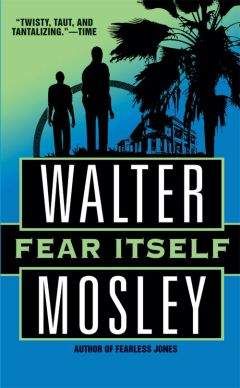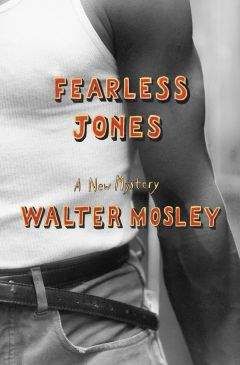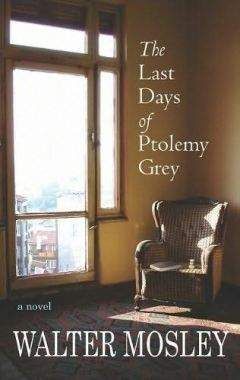Walter Mosley - The Long Fall
Ambrose asked me if I could do what he could not.
That’s where Randolph Peel came in. Randy had been a detective in the NYPD until they found him trading favors for sex at a posh midtown hotel. At one time he was the partner of a cop named Carson Kitteridge. Kitteridge was an honest cop, and it had been speculated that he was the cause of Peel’s downfall.
Randy was out of a job but he still had a few friends in the department. For three hundred dollars a head, the former policeman broke the seals of justice and delivered the identities to me; three of them, at least. Jumper, Big Jim, and Toolie had gone on to commit adult crimes, but B-Brain was clean. I had a name, Roger Brown, but there was no practical information, like a current address. There were no adult records on him and the details of his adolescence were all cold as far as an investigation was concerned. His father was nowhere to be found, and his mother, Myra Brown, as far as I could tell, had died in 1993.
THE SEAGULL CRIED three times before I answered the phone again.
“Hello?”
“Who hired you?”
“It’s not polite to hang up on a brother, Roger.”
“I’m not your brother.”
“You still hung up on me.”
“Excuse me,” he said, maybe even meant it. “I’m not used to private detectives calling me on the phone.”
“You called me,” I reminded him.
“You came to my office.”
“It’s not so bad,” I said, “being sought by a PI. Nobody said you did anything wrong.”
“Who hired you?”
“Are you the Roger Brown who was once known as B-Brain?” I asked again.
The silence was long and painful. Roger didn’t want to hang up a second time. He didn’t want to answer my question either. There was music playing in the background of whatever room he was in; thuggish hip-hop with an insistent beat.
“How much they payin’ you, man?” a slightly different Roger Brown asked. This young man didn’t wear a suit and tie or collect a salary that had taxes taken out.
“My regular fee.”
“I’ll double it.”
“You don’t know what it is.”
“I’ll pay you a thousand to forget me.”
“Are you in trouble, Roger?”
“Naw, man. I ain’t in no kinda trouble.” His descent from Madison Avenue to the Lower East Side continued.
“Because,” I said, “I only ever charge my standard fee. I never take more. That way I keep my nose clean.”
“Why you up in my grill, man?”
“All I need to know from you is if you are the Roger Brown known as B-Brain.”
“Why?”
“I’ll tell you what, Roger,” I offered. “I’ll come over right now and meet you at that little espresso place across the street from your office or anywhere else you say. We could talk.”
“Uh-uh. No way, man. I ain’t meetin’ you nowhere, no kinda way.”
I had already been to his office. He didn’t know what I looked like. Even if Juliet had described me, he didn’t have my picture in his head. But Roger wasn’t being rational. He was afraid of something, and I wanted to know what that something was.
I made a few sounds that were meant to express hesitation.
“I’m not used to giving out information on my clients,” I said. “That kind of breach in confidentiality is not looked upon kindly in my profession. But maybe if we got together you might convince me.”
“I already told you, man. No.”
Roger wasn’t going to trust me even though I was telling him the truth. I wanted to meet him face-to-face so that I could judge for myself if he was in some kind of fix that Ambrose had not informed me about.
“Frankie Tork,” I said and the line went so silent that for a moment I thought the connection had gone dead.
“S-say what?”
“Frank Tork. He’s in the Tombs right now awaiting trial on B and E. They caught him trying to burglarize a pawnshop on Second Avenue.”
“Frankie hired you?”
“I AIN’T SEEN B-Brain in years, brother,” Frankie Tork had told me through a Plexiglas window in the visitor’s area of the New York City jail. “His moms and them moved somewhere out in Brooklyn right before his last year in high school. She said that we was a bad influence.”
Jumper was small and wiry, brown like a walnut is brown, with tar-stained teeth and bloodshot eyes. He had the kind of smile that frightened children—and their mothers.
“What was his mother’s name?” I asked, trying to corroborate the sketchy information I’d gotten from ex-officer Peel. Roger, aka B-Brain, and the others had been arrested for trespassing in 1991.
“Mrs. Brown,” Frankie said.
“You don’t know her first name?”
“You still gonna gimme that twenty dollars, right?”
There was an account I could credit. I would have given him the money even if he wasn’t any help.
“What was B-Brain’s first name again?” I asked.
“Roger.”
“Yeah, I’ll give you twenty bucks.”
“Maybe I could ask aro="1could aund, about his mom’s name, I mean.”
“No thanks, Jumper.” I made to rise.
“Hey, hey, man.”
“What?”
“They say around here that you the kinda dude get a brother out of a jam.”
“I used to do that. Not anymore.”
“How much?” Jumper asked, ignoring my claim of retirement.
“Twenty thousand was my lowest fee.” That was a lie. No one had ever paid me that much. But I didn’t want to give Jumper false hope.
“Damn, man. All I got is the twenty dollars you payin’ me.”
“See you.”
“... WHY JUMPER WANT you to find me?” Roger asked, admitting that he was the man I was looking for.
“His lawyer, Matrice Johnson, is a friend of mine. Professional. She asked me to find somebody who could be a good character witness for Frankie, said that it might make a difference between three and seven years in the sentencing.”
“I haven’t seen Frankie in sixteen years, man. How’m I gonna be a character witness for somebody I don’t even know no more?”
“Well,” I said, “if you’re not willing to help a brother out . . .”
“He’s not my brother. And how the hell you even know how to find me?”
“Some girl,” I said.
“What girl?”
“A friend of Jumper’s—Georgiana Pineyman. She saw you come into Berg, Lewis & Takayama a few months ago but when she tried to get to you they turned her away at the front desk.”
“Well, you found me but I can’t give Jumper a reference. I can’t. I don’t even know him anymore.” Roger was feeling some relief. His language drifted back toward the semi-sophistication of an investment advisor.
“Okay. My job was to find you and ask for your help. That’s all.”
“So we finished?”
“Goodbye, Roger.”
Ê€„
6
Just a year and a half before I wouldn’t have had the slightest compunction at turning Roger’s name over to Ambrose Thurman. Even that day, if Roger was a hood like hi/di„s old friends, I wouldn’t have been bothered.
But as things stood I had misgivings.
On the one hand Roger sounded scared, on the other the rent was due and there were no new jobs on the horizon. Aura liked me, maybe she even loved me, but she was going to do her job. I’d be on the street by the end of the month if I didn’t pay the landlord’s fee.
“Money is a chain that the worker willingly wraps around his own neck,” my father had said many a time. “It chokes him and weighs him down until finally, one day, he would kill his own brother for just a few minutes’ relief.”
Maybe if my father, Tolstoy McGill, hadn’t gone off to South America to fight the fascists or the capitalists or whoever, maybe if he’d come back and been a parent to me, I would have tried to live by the vision of his perfect world. Maybe if my mother, once she knew the love of her life was never coming back, hadn’t gone to her bed and lay there until the doctors came and took her off to the hospital to die, maybe then I would have taken a different path.
But as it was I had to make my own way in a world of chains and choking, imperfect choices and the fools who made them.
“HELLO?” AMBROSE THURMAN said, answering his phone on the first ring.
“I got all four names.”
“What are they?”
“You want ’em over the phone?”
“Yes, indeed. Time is of the essence.”
“You see, you and me got something in common there, Mr. Thurman.”
“What’s that, Mr. McGill?”
“I want my money.”
“I can’t give you your, your remuneration on the phone.” He used the word as if trying to learn it, to integrate it into his vocabulary.
“And so I can’t give you what I got.”
“I can send it to you via overnight mail.”
“I have a better idea.”
“What’s that?”
“Why don’t you come down here this evening and we’ll trade information and money across a table, face-to-face.”
I wasn’t my father or my mother. I wouldn’t run away or lie down and give up.
“Meet me at the Crenshaw tonight at nine forty-five,” Thurman said in angrily clipped wordsizeclipped.
“That’s what I’m talkin’ about.”
THE AFTERNOON PASSED quietly enough. I logged onto the BBC website and perused the world, starting in Africa. I always start there, looking to see what the news providers of American TV didn’t deem important.
I had worked my way through South America and Asia before Twill came back to mind. I couldn’t let him know that I had bugged his IP. Not that I was worried about him getting upset but because this wouldn’t be the last intervention I’d have to make in his formative years. It wasn’t the first, either.
At the age of fourteen he had already spent six months in a juvenile facility for stealing middle school property.
“I got the idea from something you said, Dad,” he’d told me when we got home from the police station after his initial arrest.
“From me?”
“You were always sayin’ how people in Africa and other places didn’t have the tools they needed to compete, so I found out about the School Supply Fund and set up a fake office to sell computers to them.”
“How much property did you move?” I asked. The boy had been arrested for stealing five computers and three microscopes.
“A lot,” young Twill answered.
He’d organized a group of adolescent thieves at eleven schools, kids that he’d met through his sister’s Leadership Camp the previous summer. They had cleared over fifteen thousand dollars and still gave the NGO a great deal.
Luckily the authorities didn’t have enough of an imagination to delve into the depths of Twilliam’s crimes. But I was put on notice to keep him out of trouble.
When I looked up, the sun was setting. Twill always gave me both worry and wonderment. He was the only person I’d known who met me halfway in life.
AT ABOUT 8:30 I walked across from the Tesla to the East Side and took a subway up to Eighty-sixth Street. From Lexington I walked two blocks north, and east for three. There I came to the Crenshaw, an exclusive little hotel that catered to an upscale clientele.
The doorman, clad in a red coat and black trousers, gave me a look like Juliet had at Berg, Lewis & Takayama. I smiled as pleasantly as I could, walked past him, and made my way to the bar. It was a dark room of red lampshades and dark-stained wood. I was half an hour early but Ambrose was already there at a small round table near the high bar. He was seated in a spindly chair with his hands clasped on his lap. I remember thinking that he was just sitting there, not reading a newspaper or a book, not searching his BlackBerry for e-mails and text messages. He wore a dark-gray suit with a bright-red vest and a checkered blue-and-white ascot. His glass frames werganss frame small and rectangular, and his blue, blue eyes didn’t miss a thing.
“Mr. McGill,” he said through a meaningless smile. “Have a seat.”
He gestured at a sturdier chair across from him.
I sat, putting an elbow on my left knee and a palm on my right. I took that position to let Thurman know that I meant to get down to business.
“Wonderful weather, isn’t it?” he said. “They talk about global warming but every year seems more moderate than the last, cooler and more habitable.”
“Why does your client want these names?” I said.
Ambrose swiveled his head slowly, making sure that no one was listening.
“Why does anybody want anything?” he asked, moving his shoulders in a kind of bound-up shrug.
“I do it for the money,” I said. “But not if it causes trouble for somebody who doesn’t deserve it.”
Ambrose smiled.
“I’m not joking with you, man,” I said. “I need to know what you’re going to use this information for.”
Thurman was in his forties but looked older. He was bulbous, with a receding hairline and pudgy, pale hands. He used his little mitts to pull down the Ben Franklin spectacles, peering over the frames at me through the gloom of the posh bar.
“I was told that you were the kind of man who did a job with no questions asked,” he said.
“Who told you that?”
“It doesn’t matter who it was. What matters is that I seem to have been misinformed.”
“I used to be a heartless kind of guy, Mr. Thurman,” I said. “If a job needed me to be cold-blooded, cruel, or blind I was willing to oblige. But today I need to know what you plan to do with what I give you.”
“Are you trying to up your remuneration?” he asked, missing the honesty in my tone.
“Not really.”
Thurman pushed his foppish glasses up and sat back in his chair. Considering me, he took in a deep breath through his nostrils.
“A person, the name doesn’t matter, had a son who died tragically and comparatively young. It was one of those quick and terrible diseases that come out of nowhere and leaves a happy home bereft.
“This person, the parent, was once a rough-and-ready sort with no money and few prospects. They lived on the Bowery and raised their son there. These atthere. young men were his friends. Next month will mark the first anniversary of the boy’s death, and my client, the boy’s parent, wishes to include his old friends together in the memorial service.”




